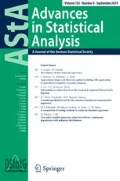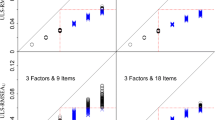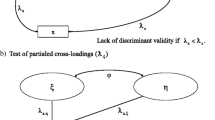Abstract
The variance of short-term systematic measurement errors for the difference of paired data is estimated. The difference of paired data is determined by subtracting the measurement results of two methods, which measure the same item only once without measurement repetition. The unbiased estimators for short-term systematic measurement error variances based on the one-way random effects model are not fit for practical purpose because they can be negative. The estimators, which are derived for balanced data as well as for unbalanced data, are always positive but biased. The basis of these positive estimators is the one-way random effects model. The biases, variances, and the mean squared errors of the positive estimators are derived as well as their estimators. The positive estimators are fit for practical purpose.
Similar content being viewed by others
References
Bennett, C.A., Franklin, N.L. (1954) Statistical Analysis in Chemistry and the Chemical Industry. Exxon Monograph. Wiley, New York
Cochran, W.G. (1934) The distribution of quadratic forms in a normal system. Proceedings of the Cambridge Philosophical Society, Suppl. 4, 102–104
Graybill, F.A. (1961) An Introduction to Linear Statistical Models. Vol. 1. McGraw-Hill, New York
Hartung, J. (1998) Schätzen der Varianzkomponenten bei gepaarten Messungen ohne Wiederholungen (“zerstörende Prüfungen”) in K Gruppen. Unpublished results based on a research contract financed by the European Union (EU), Luxembourg (1998)
Hartung, J. (1999) Ordnungserhaltende positive Varianzschätzer bei gepaarten Messungen ohne Wiederholungen. Allgemeines Statistisches Archiv 83, 230–247
Hartung, J. (2005) Statistik, Lehr- und Handbuch der angewandten Statistik. 14. Auflage, R. Oldenburg, München, Vienna
International Atomic Energy Agency (IAEA) STR-327 (2001) Department of Safeguards: International Target Values 2000 for Measurements Uncertainties in Safeguarding Nuclear Materials. Vienna, Austria
Martin, K., Böckenhoff, A. (2006) Analysis of paired data without repetition of measurement. Allgemeines Statistisches Archiv 90, 365–384
Rao, P.S.R.S. (1997) Variance Components Estimation. Mixed Models, Methodologies and Applications. Exxon Monograph, Chapman & Hall, London
Scheffé, H. (1959) The Analysis of Variance. Exxon Monograph, Wiley, New York
Author information
Authors and Affiliations
Corresponding author
Rights and permissions
About this article
Cite this article
Martin, K., Böckenhoff, A. Analysis of short-term systematic measurement error variance for the difference of paired data without repetition of measurement . AStA 91, 291–310 (2007). https://doi.org/10.1007/s10182-007-0036-z
Received:
Accepted:
Published:
Issue Date:
DOI: https://doi.org/10.1007/s10182-007-0036-z




